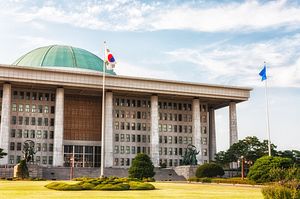A five-year old anti-terrorism bill is back in the news in South Korea. As the country eyes possible terrorist threat from North Korea, the ruling Saenuri Party is trying to finally push the bill through the National Assembly, despite concerns over privacy and potential abuse of surveillance authority.
A draft of the anti-terrorism bill was first introduced into the National Assembly in 2011. Yet the bill has never made any headway, due to concerns about the potential for South Korea’s National Intelligence Service (NIS) to abuse the powers granted to it by the bill.
The current draft calls for creating a new anti-terrorism center under the prime minister’s office, a compromise designed to ease opposition concerns about giving the NIS unchecked authority. The new center would work with NIS to gather and analyze intelligence in order to prevent terrorist attacks. However, the bill would still ultimately increase NIS authority to conduct surveillance, which has South Korea’s opposition concerned.
“The proposed anti-terrorism bill is about increasing the powers of the National Intelligence Service (NIS). The agency could abuse the law, if enacted in that way, to monitor liberal politicians and activists,” Rep. Lee Jong-kul, the floor leader of the Minjoo Party of Korea, South Korea’s main opposition party, told MPK members.
South Korean President Park Geun-hye has called for the passage of bill for months, saying last November that the country is not safe from terrorist attacks. This week, her office again urged the National Assembly to pass the bill, citing the elevated risk of terrorist attacks from North Korea.
“The possibility of North Korea’s anti-South terrorism becoming reality is rising to an ever-higher level,” Presidential Office spokesperson Kim Sung-woo said in a statement. He called on South Korea’s legislature to “swiftly pass the anti-terrorism law so that we have the legal and systematic foundation to protect the lives and property of the people.”
The NIS itself warned last week that North Korean leader Kim Jong-un has ordered preparations for launching terror attacks against South Korea. An anonymous Saenuri Party official, who was present at an NIS briefing, told the Associated Press that potential targets could include defectors and government officials, as well as public places such as malls and subway stations.
However, the bill was not designed only with North Korea in mind. NIS has also warned of South Koreans attempting to join Islamic State, and of migrant workers in the country who have possible ties to the Middle Eastern militant group.
On Tuesday, National Assembly Speaker Chung Ui-hwa called for the bill to be put to a vote. However, it was successfully blocked by a filibuster from the MPK – the first use of a 2012 rule that allows for such a tactic in the National Assembly. According to Yonhap News, MPK plans to filibuster the bill until at least the end of the week, by having its legislators take turns delivering hours-long speeches.
































